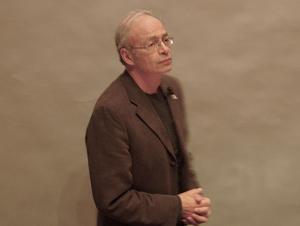An ethical argument for charity contributions
Australian philosopher and Princeton University bioethics professor Peter Singer is well known as the author of “Animal Liberation”. That book, published in 1975, made an argument for the recognition of animal rights. Now, Singer, a professor of bioethics at Princeton, has a new book that focuses on human beings. It’s called “The Life You Can Save”.
This time, Professor Singer makes an ethical argument about helping the world’s poor. In fact, he makes the point that choosing not to give aid to poor people is in itself an unethical act. To make that point, Singer asks readers to imagine themselves walking past a shallow pond in a park and noticing that a small child has just fallen in.
"Of course you think, “I should rescue that child. I can easily wade into that pond. It’s quite shallow and pull out the child.” And if the thought occurs to you that just this morning you’ve put on your best pair of shoes, quite an expensive pair of shoes, which will be ruined by wading into the muddy pond, you should – and I think almost everybody would — put that thought out of their head.
"If you thought about it at all, you would say, “What’s a pair of shoes compared to a child’s life?” But the point I make is that in the real world in which we are living, sometimes the cost of a pair of shoes might be enough to save a child’s life, to prevent a child dying of diarrhea or to immunize a child against measles or to protect a child against malaria. These are things that can be done for relatively small amounts of money, and yet we don’t do it."
Singer is asking for people to really visualize these people on the other side of the world when they may feel that they’re doing an awful lot at home in volunteering and giving.
"It may be that charity should begin at home, but I certainly don’t think it should end at home and I don’t think it should even tail off as steeply as it does as we move further from home. Yes, it’s great to help people around the home, but the people who are really in extreme poverty generally are not near us. And for very small sums of money, you can do enormous things in developing countries.
"You can donate $50 to the Fred Hollows Foundation and they can perform an operation that will enable somebody who is blind to see again. You can donate $450 to the Fistula Fund, and they can repair an obstetric fistula on a girl who’s given birth too early and now has a condition which is going to totally ruin her life in some parts of Africa. Girls with this condition can’t afford to get them repaired and they become a social outcast for the rest of her life. $450 dollars could give that girl her life back.
"I’m asking people to give a portion of their income to the world’s poor. For most Americans, it’s a very modest portion. I’m suggesting if you’re in the bottom 90 percent of taxpayers, that is, you’re not earning more than $105,000 a year. Just start by giving one percent of what you earn. So say $500 dollars a year if you’re earning $50,000 a year to some of these organizations.
"You may think about increasing that, and if you get to be earning above $105,000 so you are in the top 10 percent of US taxpayers, I suggest you should be giving five percent of what you earn. And the scale increases as you earn more, so eventually it gets up to a level of giving a third of what you earn, but that’s only for people who are extremely wealthy and are earning millions of dollars a year.
Singer is optimistic about people getting on board. He has studied the way we behave and why we behave the way we do and the sort of passivity that’s there. In a way it’s a touchy subject, telling people what to do with their money.
"I’m really hopeful that there’s a possibility of changing our culture in this, and at least – you know, you can say we won’t really know until we try. So we’ve got to try."
Support PRI when you purchase Singer’s latest book,"The Life You Can Save: Acting Now to End World Poverty"
PRI’s "The World" is a one-hour, weekday radio news magazine offering a mix of news, features, interviews, and music from around the globe. "The World" is a co-production of the BBC World Service, PRI and WGBH Boston.
